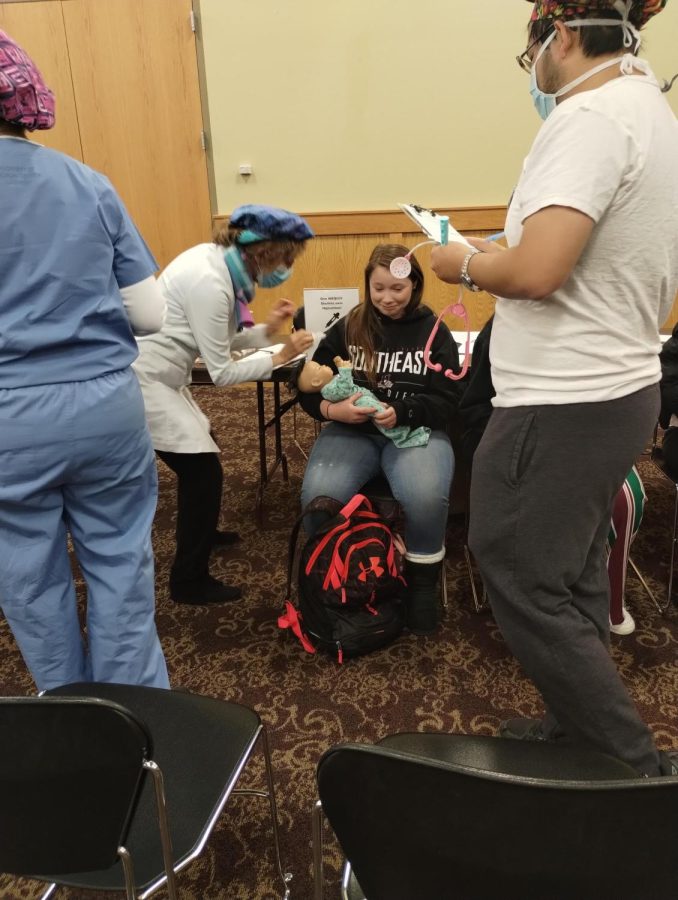The World in Your Backyard: How Attending a Refugee Simulation Opened My Eyes
A student learns that the 12 year-old she is playing in the simulation is pregnant.
November 21, 2022
How many – or few – refugees have actually resettled in the United States?
I like to believe I’m well-educated and informed.
So when that innocuous question was posed, I thought the number might be 50%. It sounded reasonable.
Nope.
Only 1% are resettled. The rest must stay in the refugee camps.
Oh, my!
So much for my hypothesis.
Call me callous, but it takes a lot for me to react emotionally to data. I have competed in policy debate for seven years, most of it before college, so heartbreaking stats rarely faze me. If immigration terminology isn’t familiar to you, resettlement means moving from an asylum country to a state where refugees can resume earning a living and rebuild their standard of living without fear of persecution.
The 1% figure was one of many startling facts I learned from the “Walk a Mile in My Shoes” refugee simulation at IUS earlier this semester. Think of it as immigration politics colliding with an obstacle course.
Jud Hendrix, executive director of a Louisville education and peacemaking nonprofit, and Dr. Kelli Dehr Bernedo, Assistant Professor and Coordinator of ENL/ESL Education, detailed the struggles among people who fled their home countries and eventually ended up in ours.
Bernedo, Hendrix and others organized a pilot this fall with education majors and invited guests experiencing the simulation. The organizers hope all IUS students and employees can eventually do so, too.
The simulation, which consisted of required stops and checkpoints, took me about two hours to walk through. It consisted of a series of outdoor and indoor tables where volunteers role played doctors, United Nations council members and English as a Second Language teachers.
The tables were set up to mimic the journey of these make-believe refugees, whether it was through Border Patrol or immigration court.
This simulation was far more sobering than most TV reality shows, but it borrowed from the latter. Groups of at least three IUS students at a time formed make-believe families trying to enter the United States. Each “family” received a packet of information based off real-life refugee narratives that shaped what unfolded as they went from one table to another.
But sometimes it was a matter of if they were allowed to advance to the next checkpoint.
At the mock immigration court, student after student pled their case, their nerves obvious in their high-pitched voices and trouble talking in complete sentences. Some “family” members were as young as five. A few had never had formal schooling. Some were fleeing war or violent gangs in their native countries.
Suddenly, this simulation meant much more to me.
I wandered indoors to check out more tables. The Hoosier room was flooded with weary students.
At the health screening, families met doctors and grim realities. Because many had never had professional healthcare, they were shocked to learn their children or they had diseases such as typhus, syphilis or dysentery. One family was told their 12-year-old daughter was pregnant. Even without a real-life consequence, the eyes of the IUS student role playing this girl grew big. How would she care for a baby when she knew hardly any English?
Several students spoke of how strenuous this aspect of the simulation was. Their uncertainty, impatience and the frustration of just wanting to move on to the next checkpoint were audible and visible.
But in real life, you can’t simply move on to the next table or the next step whenever you want.
You can’t skip troubling immigration processes. You must cope with and deal with the situation at hand–not for the few hours required for the simulation–but often for years. You must break through whatever bureaucratic red tape has been imposed. This reality is what surprised me. As I saw “families” learn they would be confined to the refugee camp, marking the end of their simulation experience, that 1% statistic really hit home.
Kentucky has the fifth largest refugee population in America, according to the nonprofit Kentucky Refugee Organization. The refugee crisis is incredibly local. I went into this simulation mistakenly believing that helping refugees was possible only through international means, such as teaching English in, or joining a mission to a developing nation.
Because of my experience, I am pursuing volunteer work with the nonprofit Kentucky Refugee Ministries.
I have also learned that the world is truly in my backyard.


